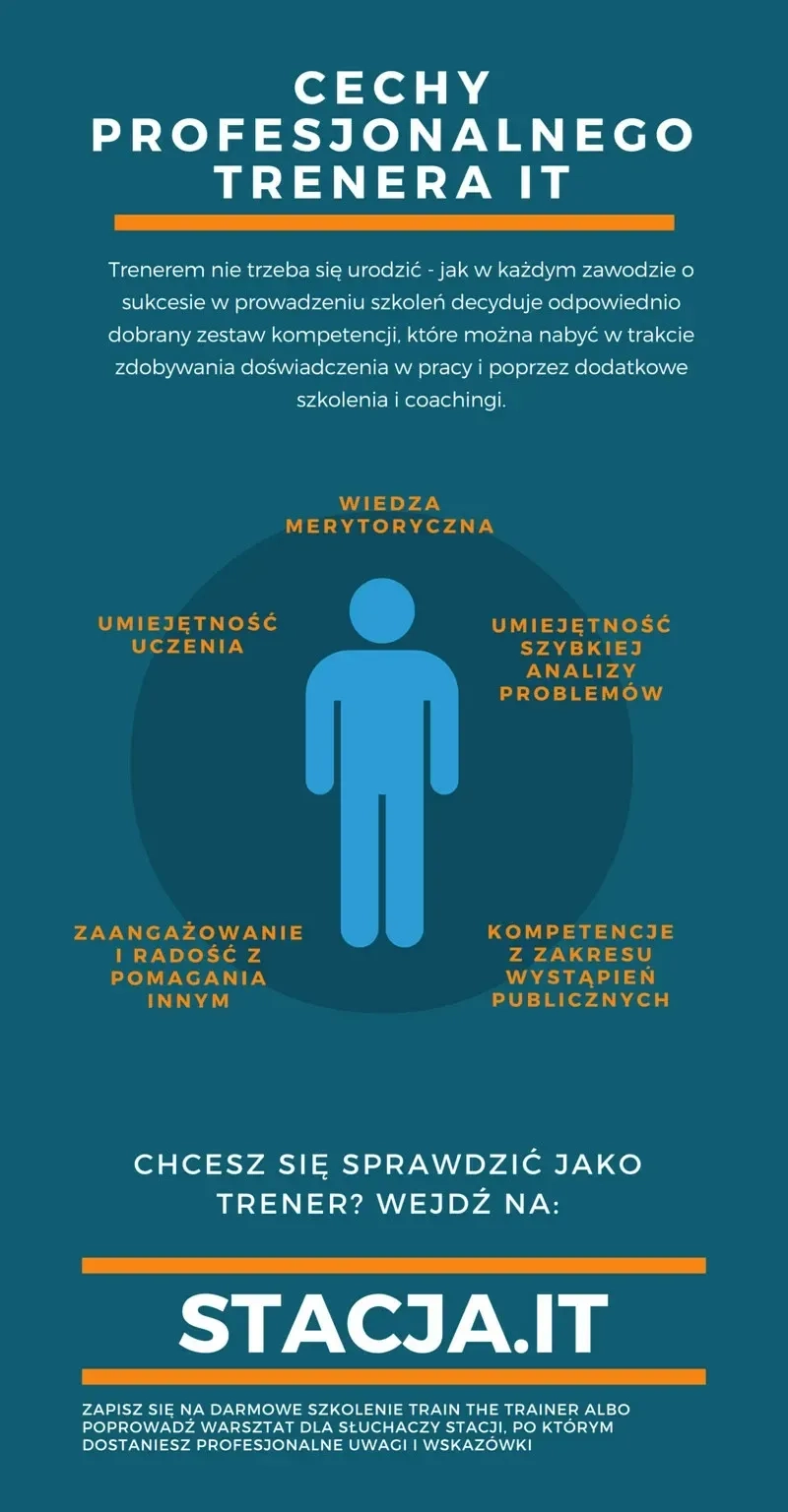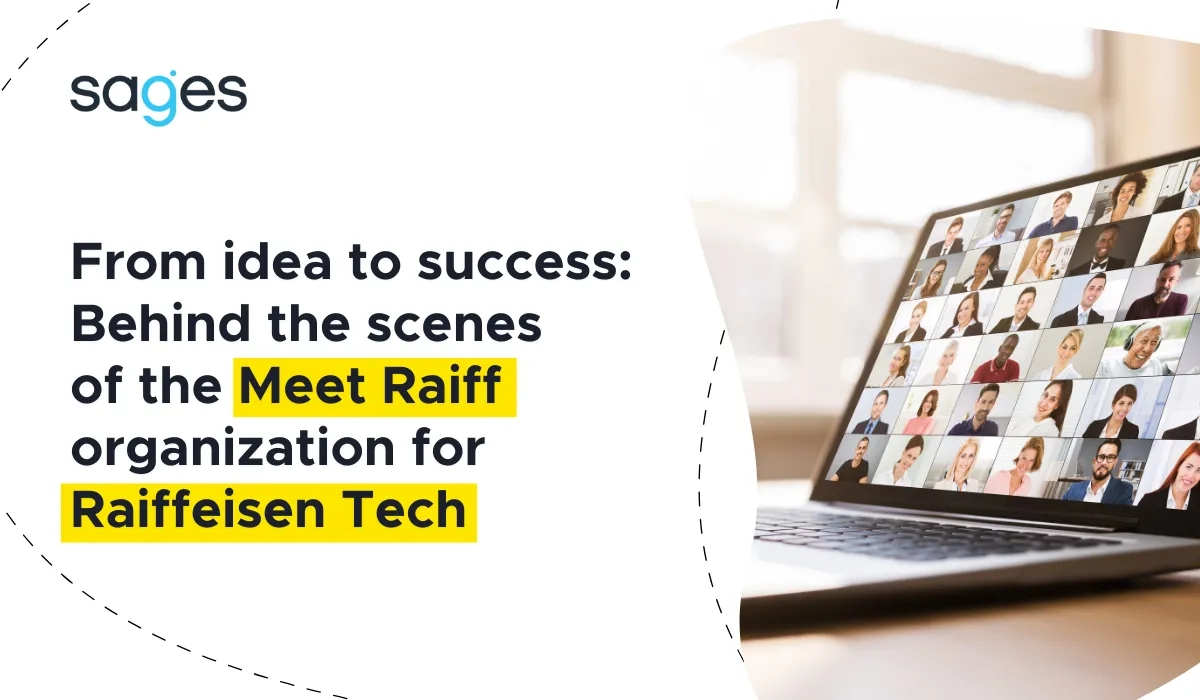The success of a training project depends on a number of factors, including a well-conducted analysis of the group's needs, the identification of individual and group training objectives, and the selection of appropriate methods of knowledge transfer. The training project begins much earlier than the training itself in the room with the trainer, which is usually not obvious to those starting out as trainers. Undoubtedly, however, the time of the actual training, those few days that the trainer spends with the group, are a key part of the whole process. In this part of the training project, the preparation and competence of the trainer are crucial to achieving the objectives. Both "hard" competencies, substantive, in the area of the training subject matter, but also "soft" competencies are important, such as the ability to transfer knowledge, work with the group and get their message across to individual people in the room.
Specialists vs. didacticians
Training courses at Sages are overwhelmingly conducted by specialists --- people who work with the technologies they teach on a daily basis. Many times they are also co-developers of these solutions and technologies, for example, working on the development of open-source projects. The substantive scope of the training is determined by the author and reviewed by two other specialists in the subject area (similar to what happens in science --- the peer review concept).
We therefore have a strong belief in the high "hard" competence of our trainers, who are not theoreticians working on templated material, but practitioners showing solutions to real problems that may arise in everyday work with a particular technology or methodology. An area where we can help the professionals who work with us is in the area of soft skills, so that they complement their substantive knowledge of training with the ability to work with a group and teach others.
Each trainer at Sages therefore undergoes trainer coaching, which is an individual, intensive version of Train the Trainer training, that is, training that prepares you for the role of a trainer. During such coaching or training, the participant organizes his general knowledge of training projects, so he learns about the success criteria mentioned at the beginning, the structure of the overall project and his role in it. He learns how to implement the substantive part of the training needs analysis and match the scope of the training to the group, as well as the right methods and tools. We talk about building the authority of the presenter and the involvement of the group.
After such preparation, already in the course of regular work, we support trainers by attending each other's training sessions and giving each other feedback (professionally, such activity is called trainer supervision), as well as analyzing and responding to surveys from trainees on a regular basis.

How to teach others?
We place great emphasis on the issue of teaching methodology, especially teaching adults. What form should the training take? How to choose the proportion between practical exercises, discussion and lecture? Should we devote the entire training time to thoroughly practicing a selected aspect of some technology that seems most important, or speak briefly about the entire spectrum of possibilities? Hint: it depends :)
Namely, it depends on the nature of the training, which we decided to apply to a particular case, based on the analysis of the requirements. We will talk about the different types of training and the implications of this in the next post on this blog. In short, however, for many groups, consisting, for example, of people with different roles in the IT team (programmer, analyst, administrator), the most valuable will be a training course that shows the ecosystem of some technology holistically, with a level of detail that allows you to really understand the point of some library, its advantages, disadvantages and area of application, without a detailed exercise of, for example, an API. This kind of level of detail also makes it possible to quickly implement on one's own to use a given solution, already after the training --- usually the first steps are the most difficult.
For other groups, on the other hand, such as a team of developers who have encountered a difficult problem while using their chosen technology, or have inherited a project from another team, it will be crucial to become proficient in using it during the training, in which case the scope of the training must be much narrower and the level of detail greater.
It is crucial for us to profile the knowledge of learning methodologies in terms of technical training, and in particular training for IT teams, as these are the ones we train most often. A communications training course for a conflicted HR department is completely different, a training course preparing for certification is different, and a consultative training course for a team of developers who need to quickly implement the use of a new or previously unknown technology is still different.
How to inspire others?
The second "soft" aspect important in conducting training is the competence associated with delivering engaging and inspiring public speeches. During training, the trainer is an actor on the "stage," observed and evaluated by all participants. A professional trainer must be aware of the factors that affect how he or she is perceived by the group and the tools he or she can use to build a bond between the presenter and the participant in a planned way. Like an actor who uses gestures and voice to reinforce and direct his message, a trainer builds engagement and strengthens communication with participants using the same methods.
Many of our trainers are long-time speakers at national or international conferences, experienced in giving presentations to large audiences or conducting intimate hands-on workshops. This kind of experience is invaluable in conducting trainings, where you can use your acquired presentation skills to appropriately build relationships with class participants.
Regardless of the previous experience of the specialists working with us, we support them with periodically organized workshops, which are conducted by theater actors and experienced speakers. These workshops are aimed at improvement in experienced people and professional preparation for those beginning their coaching career.
For a novice trainer, the very fact of having to "be in the middle", "go on stage" and deal with the stress of having the attention of everyone else in the room focused on you can be a problem. Stress negatively affects all aspects important in the perception of the presenter by the participants: ill-considered gestures, posture, movement, gaze, or use of voice. During the acting workshop, future trainers practice the conscious use of all these elements in order to gain confidence when conducting classes: the conviction that they know what tools to use and when it is appropriate.
In addition to acting tools, the knowledge and competence to present information professionally is also extremely important. This knowledge consists of the ability to properly plan a speech, to give it the right structure or convention, resulting in a message that is memorable with its audience.
Can I also become a trainer?
Many people feel an intrinsic need to share their knowledge with others --- whether simply at work, advising colleagues, conducting internal workshops and training sessions, or at conferences and industry meetings. For some, it may be an external compulsion, such as when a new team needs to be prepared for a project after being promoted to team leader. Whatever your motives, starting the adventure of public speaking and imparting knowledge to others is usually difficult, because it requires overcoming your own limitations and learning from your mistakes.
It's usually a good idea to start small and then move on to running --- in other words, start with an etude (as one of my philosophy teachers used to say), and only later try your hand at composing concerts. It is worth suggesting to colleagues at work to organize a workshop of a few hours, and then collect anonymous feedback in the form of evaluation surveys (preferably largely descriptive). This will allow you to verify the author's idea for a class in a relatively safe environment of people we know. The second step might be, for example, to speak at an industry meetup or user group meeting. These are usually hour-long presentations that allow you to test yourself in a slightly larger group.
Those who are not discouraged by these first attempts and want to hone their coaching skills in a more professional manner have been thought of at IT Station. First of all, we invite those interested to lead a full-day workshop at the Station --- a very different challenge than a twenty or forty minute conference presentation, or even a two or three hour workshop. Conducting a full-day event already requires the involvement of most of those coaching tools that appear in multi-day trainings and that we teach about in coaching training. Leading such a workshop is therefore already a challenge, but the reward is feedback from one of our experienced trainers (and, of course, from the participants), which is a concrete recommendation for possible improvement of particular elements of the coaching workshop (the aforementioned coaching supervision).
Another option is the offer to participate in a completely free Train the Trainer training, where we talk about and practice all those elements mentioned in the first part of this post, and which are crucial for success in the training room, during a conference speech, or during internal training and company presentations.
If you are still hesitating whether this is the idea for you --- email me (l.kobylinski) or Agata, who is in charge of the Station (a.kuzma) at sages.com.pl domain.




